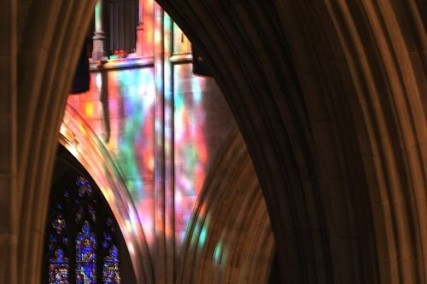
Last week, Public Religion Research Institute released an important new report on shifting attitudes about LGBTQ (lesbian, gay, bisexual, transgender, and queer) issues in the U.S.
It contains a lot of fascinating data, but much of the news I’ve read about the report has seemed to largely focus on a single finding: That around one third of American Millennials who have left their childhood religion did so at least in part because of anti-LGBTQ rhetoric or teachings.
There are a few particularly significant aspects of this that I think have been somewhat overlooked. Below are three; please read the report and share your thoughts in the comments.
1. Those leaving because of LGBTQ issues may be getting the wrong message.
PRRI reports that seven-in-ten Millennials believe that religious groups are alienating young people by being judgmental about LGBTQ issues. But the popular perception that many religious communities are broadly anti-LGBTQ doesn’t seem to reflect reality.
For example, PRRI’s new report found that 75 percent of Catholics think that other Catholics disagree with same-sex marriage—but PRRI also reports that Catholics are actually more supportive of legal recognitions of same-sex relationships than Americans overall, that Catholic support of all rights for gays and lesbians is higher than support among the general public, and that over 75 percent of Catholics think that same-sex relationships should be accepted by society.
The disconnect between religious people’s actual views on LGBTQ issues and how religious groups are perceived is widespread. Take this, from the PRRI study:
Regular churchgoers (those who attend at least once or twice a month), particularly those who belong to religious groups that are supportive of same-sex marriage, are likely to over-estimate opposition for same-sex marriage in their churches by 20 percentage points or more.
When it comes to opposing LGBTQ rights, religious institutions are of course far from blameless; but their members are also far more supportive of LGBTQ rights than many of us think.
This suggests that we need to do a better job of talking about religion in a way that reflects the diverse views of religious people, not just the most extreme points of view. Ours is a conflict-driven culture that privileges the most extreme perspectives, and we tend to associate groups with their most outrageous or hateful members.
So let’s make an effort to lift up diverse religious voices that can paint a more accurate picture. As an atheist I would prefer to see religious communities that are safe and welcoming for LGBTQ people and allies than to see those people leave their communities just because they think they have to.
Continue reading post here.







The bible is judgmental about LGBTQ issues because those are types of sexual sin. This is not a grey area. It’s black and white. LGBTQ people are always welcome to visit evangelical churches. But, they should not expect to be members as long as they remain LGBTQ any more than a bank robber should expect to be a member while he still robs banks.
Well I don’t think Chris is talking about those churches, but other churches that are more inclusive. Whether you agree with them or not, other members of the Christian faith do not see this issue as black and white.
Amen! Well written, Chris! 🙂
Well put Mark. The bible never apologizes for its positions, it claims to be absolute truth and it doesn’t matter whether even one person believes it or not. In fact at one point in our history only 8 people believed what God said was true and only 8 of the human race survived. Jesus said that as in the days of Noah, so it would be at the end of our age. The question is will we believe Him now or be herded down the broad road.